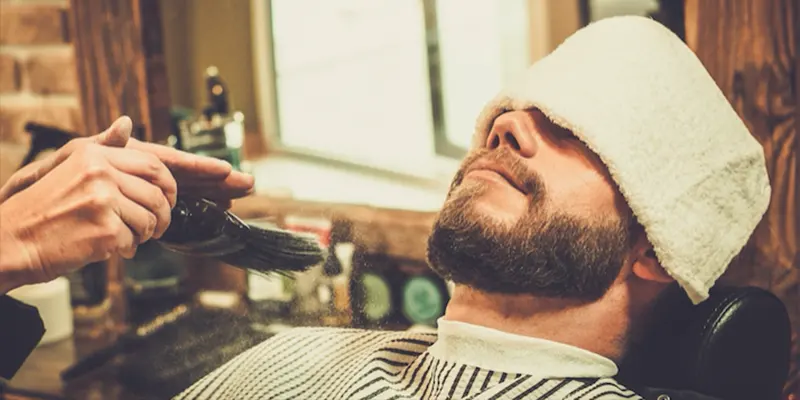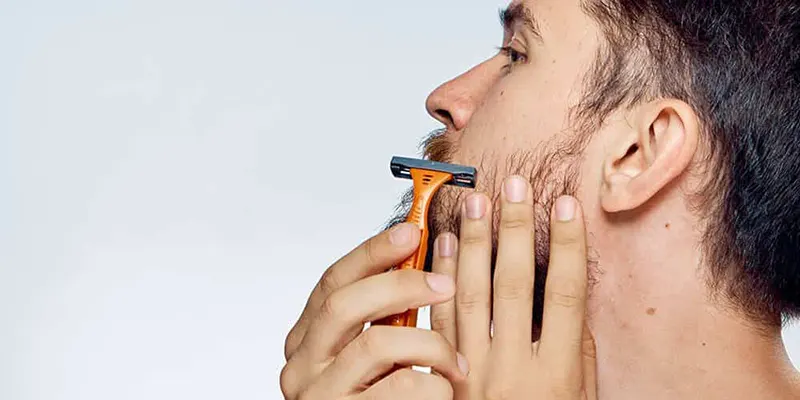There are a number of factors that impact beard growth, such as age, ethnicity, genetics, and lifestyle choices. However, some modifications to one’s lifestyle can affect facial hair growth and assist in developing a fuller beard in 2023.
This article elucidates the time requirements for mustache growth and provides recommendations to expedite the process.
How Long Does It Take for Mustache to Grow Back?

The most expedient approach to cultivate a beard or mustache is to allow it to develop naturally for three to four months without shaving. Shaving necessitates starting the process anew; conversely, permitting the hair to grow untrimmed for a minimum of 4 weeks is optimal. It bears noting that the rate of hair growth is individualized for each person. Consequently, there is no definitive timeline for how long it takes to grow facial hair.
The average daily growth rate for a beard ranges from 0.3 to 0.5 mm, amounting to approximately half an inch per month. Therefore, after one year of unchecked development with minimal grooming, the average man could grow a beard of up to six inches in length.
How Fast Does Facial Hair Grow?
Facial hair growth occurs at a consistent rate of approximately one-quarter inch per month, irrespective of shaving frequency or technique. The human body regulates maximum length limits for different types of body hair, but all hair, including facial hair, grows at essentially the same rate regardless of trimming frequency.
How to Improve the Rate Your Beard Grows?

Exfoliate to Remove Dead Skin Cells
Most individuals have dead skin cells on their faces, preventing mustache hair growth in those areas. Exfoliating at minimum twice weekly eliminates dead skin cells and promotes facial hair growth. Caution must be exercised to utilize proper quality exfoliants for one’s skin type, whether oily, dry or combination. The correct exfoliant scrub should be selected based on individual skin needs.
Increase Protein Intake
Consuming a high-protein diet is highly beneficial for growing thicker facial hair. The outer layer of hair is predominantly composed of keratin, and eating foods high in protein such as nuts, meat, and eggs stimulates keratin production and strengthening. This results in not only increased beard growth but also greater beard strength.
Ingest Adequate Vitamins and Minerals
Deficiencies in certain vitamins can significantly inhibit facial hair growth. Without consuming a nutritious diet or obtaining adequate amounts of key vitamins like B1, B6, and B12, mustache growth may be delayed.
Obtain Adequate Sleep
Insufficient sleep often inhibits hair growth. Inadequate rest can disrupt hormonal production of testosterone and dihydrotestosterone (DHT) required for beard growth. A study by the National Institutes of Health entitled “Sleep deprivation decreases beard-hair growth in men” found that 48 hours of sleep deprivation in a group of men resulted in a 19% reduction in their beard growth rate.
Adequate sleep is imperative for overall health and beard growth. Since the body produces testosterone primarily during sleep, getting 7-8 hours of sleep nightly allows optimal production of beard-stimulating hormones. Studies demonstrate that a healthy sleep cycle markedly increases the rate and consistency of hair growth.
Limit Alcohol and Hydrate with Water
While silicone in a single beer can promote faster, healthier beard growth by improving blood flow, excessive alcohol leads to dehydration and elevated cortisol levels, which inhibit growth.
Water is the primary carrier of nutrients and lubricant to follicles where beard hairs grow. Since hair composition is 25% water, proper hydration is essential for optimal functioning. The recommended water intake is half of one’s body weight in ounces daily.
Engage in Exercise
Exercise boosts blood circulation and increases testosterone levels. Incorporating physical activity into one’s routine, especially in the morning when testosterone levels peak, can be beneficial.
Use Coconut Oil
Applying coconut oil to the skin as part of a beard care regimen may facilitate beard growth. Coconut oil contains lauric acid, which promotes hair growth, along with vitamins E and K that soften follicles and moisturize the skin to encourage growth. Due to its lightweight consistency and molecular structure, coconut oil is readily absorbed into follicles and skin for rapid results.
Causes of Delayed Beard Growth

Research indicates an enzyme present in the oil gland of male hair follicles activates the hormone dihydrotestosterone (DHT), a byproduct of testosterone. Lower DHT levels are one of the primary reasons for slow beard growth.
Diet is another key factor impacting facial hair regrowth rate. Males following a strict diet increase testosterone while decreasing estrogen levels. This opens skin pores, enabling increased enzyme production in hair oil glands and faster facial hair growth.
Stress can lead to serious health issues like hypertension and cardiac disease. It also significantly affects the age at which males can grow beards. Stress causes release of the hormone cortisol, which prevents vitamins and nutrients from reaching hair follicles that are essential for healthy beard growth.
Conclusion
Although certain facets of beard growth can be influenced, such as daily grooming, other factors cannot. Genetics, age, and hormones are critical determinants of the rate and fullness at which a beard develops.
The growth rate and density of a mustache are chiefly dictated by genetics. Testosterone and DHT also play key roles. Supporting overall health through proper diet and exercise can help maintain optimal mustache appearance. Adequate sleep and proper hygiene are additionally beneficial. While individual control over beard growth is limited, taking measures to maximize health can promote growth to the fullest genetic potential.





